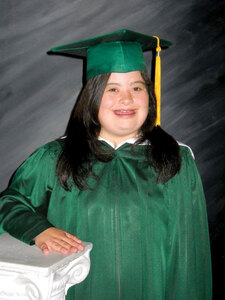Center fosters support for the disabled
For a short time in September, Sarah Hinojosa was the center of several Viterbi students’ attention.
Sarah Hinojosa, a senior at Blair International Baccalaureate Magnet School in Pasadena, has Down’s syndrome. This year, she was a subject of a disability-themed “capstone project” — a mandatory senior design project that engineering students at USC have to complete before graduation.

Inspired · For their capstone project, USC students followed the daily routine of Sarah Hinojosa, a high school senior with Down’s syndrome. - Photo courtesy of Olivia Hinojosa
The students were using the project to understand the daily difficulties for people living with disabilities, and will make recommendations to improve their lives.
Encouraging disability-oriented research, such as the study of Sarah Hinojosa’s everyday activities, is one of many initiatives currently being undertaken by the University Center for Excellence in Developmental Disabilities to incorporate disability awareness into university-wide instruction.
“We try to infuse disability content into courses at USC,” said Barbara Wheeler, associate director of the USC UCEDD. “We do lectures and social work; we co-taught a course on disability for social workers.”
The USC UCEDD has two major aims: to provide non-medical treatment and therapy to developmentally disabled community members, which primarily takes place at Childrens Hospital Los Angeles, and to seek out the next generation of disability-related professionals and caretakers.
“It’s very important that [college] students … focus on disability,” said Sarah’s mother, Olivia Hinojosa, of her willingness to see her daughter participate in the study.
The students followed Sarah Hinojosa for a day, watching her carry out daily activities. At one point, while walking back from the grocery store, Sarah Hinojosa, who is in choir and loves to sing, began to practice for an upcoming performance.
Her one-on-one aide, who assists her on a daily basis, had uploaded the lyrics to a song — Michael Jackson’s “Heal the World” — to Sarah Hinojosa’s mobile phone. The USC students were worried that Sarah Hinojosa might have difficulty operating the T-Mobile sidekick, but Sarah appeared to use the phone with ease.
“They were able to clarify with Sarah and her one-on-one that she was able to navigate this size of equipment,” Olivia Hinojosa said.
She said typically people with developmental disabilities are unable to use small equipment.
The center is hoping projects like the Viterbi students’ and other efforts from universities across the nation can help increase knowledge of disabled populations and also inspire possible innovation in the future.
“The idea was that if these children were going to be moving into the community — that was the long-term goal — that they would need to have a cadre of professionals who were skilled at working with these children and their families,” said Dr. Marion Taylor Baer, director of the Leadership Education in Neurodevelopmental Disabilities program within the USC UCEDD. “And since they have complex disorders, this needed to be an interdisciplinary team.”
Baer’s LEND program readies graduate and post-graduate level students from varied academic backgrounds for positions of leadership in disability-related professions.
“Our main purpose is to promote systemic change in our state to help people with developmental disabilities,” Wheeler said.
In its efforts to increase the interaction between researchers and people with special needs, the Center is hoping it will be able to spur enough innovation to help improve the everyday lives of people like Sarah Hinojosa.
Olivia Hinojosa said its important for students to interact on a personal level with people like her daughter. Only then, she said, can they see what types of technology developmentally disabled people have the most and least trouble operating.
“It was just one of those little, opportune moments,” Olivia Hinojosa said. “Who would’ve thought they were going to stop and practice to sing, and that they would see her navigate on this small phone?”

This gives hope to every ATO.